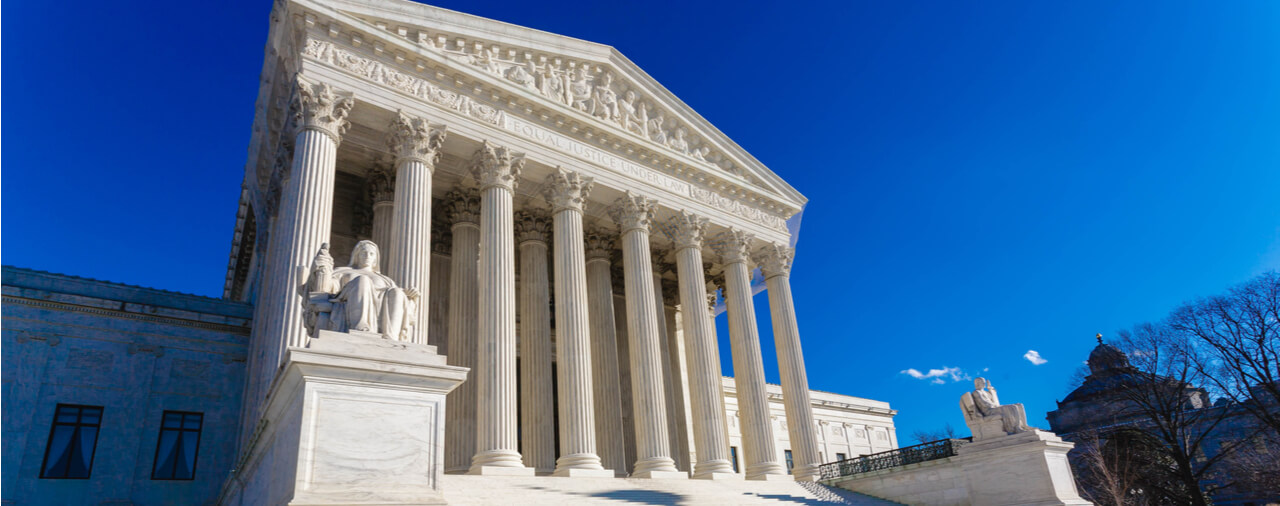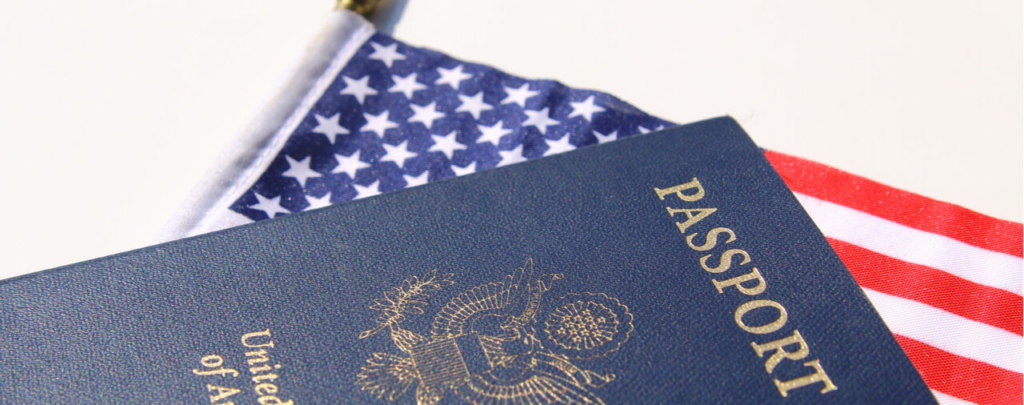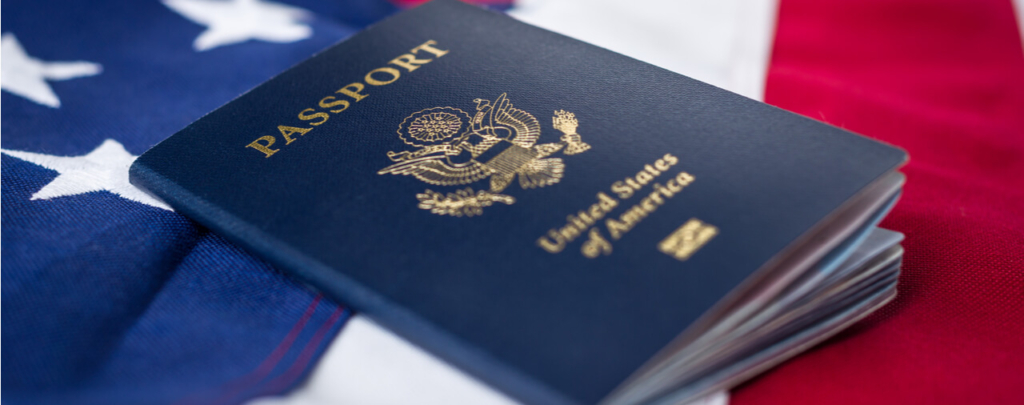- Introduction
- Oral Argument on Behalf of the Petitioner (Maslenjak)
- Oral Argument on Behalf of Respondent (United States)
- Rebuttal
- Conclusion
(June 25, 2017 Update): The Supreme Court issued its decision in Maslenjak v. United States, 582 U.S. __ (2017). The Court held that materiality is an element of 18 U.S.C. 1425(a). Please see our full article to learn more [see article].
Introduction
On April 26, 2017, the Supreme Court of the United States heard oral arguments in Maslenjak v. United States, No. 16-309 [PDF version]. The Supreme Court took the case on appeal from the United States Court of Appeals for the Sixth Circuit decision in United States v. Malenjak, 821 F.3d 675 (6th Cir. 2016) [PDF version]. The question before the Supreme Court is whether the Sixth Circuit erred in holding that a naturalized citizen of the United States can be stripped of citizenship in a criminal proceeding based on the alien having made an immaterial false statement [PDF version].
In this article, we will examine the oral arguments in Maslenjak before the Supreme Court. This article presumes basic knowledge of the issues and of the Sixth Circuit decision. For this reason, please see our article on the Sixth Circuit decision before reading about the oral arguments before the Supreme Court [see article]. Specifically, please make sure to see the sections of that article detailing the facts of the Maslenjak case [see section] and the key statutes and issues [see section]. That background will be sufficient for understanding the oral arguments that will be discussed in this piece.
Oral Argument on Behalf of the Petitioner (Maslenjak)
The oral argument on behalf of Maslenjak was presented by Christopher Landau, Esq.
Landau began by analyzing the plain text of 18 U.S.C. 1425(a). Both the government and the Sixth Circuit took the position that 18 U.S.C. 1425(a) does not require that an individual’s false statement have been material in order to convict. However, Landau argued that the words “procured contrary to the law” in 18 U.S.C. 1425(a) “require a causal link between the procurement of citizenship and the underlying violation of the law.” In short, Landau argued that one could not “procure” citizenship through a false statement that was not material to the citizenship application. This reading was contrary to the position taken by the Sixth Circuit that 18 U.S.C. 1425(a) only requires proof of a violation of any law relating to naturalization.
Justices Anthony Kennedy and Sonia Sotomayor questioned Landau on how it would be determined if a false statement was material or immaterial. To this effect, Justice Kennedy noted that, in many cases, what is material and what is a causal link “can be understood and analyzed only after the fact.” Landau addressed these concerns in two ways. First, he appealed to the gravity of stripping an individual of citizenship. Second, Landau again pointed to the language of 18 U.S.C. 1425(a), asserting that it places the burden on the government to prove “that the false statement was material.”
Justice Ruth Bader Ginsburg asked Landau to explain why any error in failing to require proof of materiality at the trial stage in the District Court would not be “harmless error.” Specifically, she inquired why Maslenjak’s false statements were not “obviously material.” Landau responded that he had asked for the opportunity to argue the issue of materiality before the jury, but that the Sixth Circuit did not afford that opportunity. Justice Samuel Alito followed up on this questioning, inquiring as to what Maslenjak’s refugee status had been based on (ethnic persecution or on Maslenjak’s husband’s military service). Landau again stated that he had been denied the opportunity to address the significance of that issue before the jury.
Justice Ginsburg asked Landau to explain “how the good moral character works into this.” This point is key because one of the two predicate offenses alleged by the government in charging Maslenjak under 18 U.S.C. 1425(a) was that her false statements about the basis for her refugee status had rendered her a person lacking good moral character when she applied for naturalization. Landau took the position that section 101(f)(6) of the Immigration and Nationality Act, which defines good moral character, only addresses false statements made to obtain an immigration benefit. Landau noted that the Sixth Circuit held that the government did not have to prove that Maslenjak’s false statements were made to procure naturalization in order to base denaturalization on the making of those false statements.
Landau criticized the government’s position that 18 U.S.C. 1425 is “a pure look-through statute to [18 U.S.C.] 1015(a), [and] sucks up any violation of 1015(a).” Justice Neil Gorsuch then questioned why section 340(a) of the INA (civil denaturalization) has an express materiality requirement whereas 18 U.S.C. 1425(a) (criminal provision) does not. Justice Gorsuch also noted that some predicate acts triggering 18 U.S.C. 1425(a) require materiality while others do not (he used the example that “you [would not] have to prove, say, a material genocide” to sustain denaturalization on that ground). For Justice Gorsuch, this raised the concern of whether Landau’s reading of the statute as requiring proof of materiality would limit the scope of 18 U.S.C. 1425(a) to some predicate offenses while excluding others.
Landau responded that the civil denaturalization statute’s inclusion of materiality with regard to statements was “a very powerful point in our favor.” However, Justice Gorsuch continued pressing the issue, observing that “illegally procure” and “material misrepresentations” are distinct terms in separate clauses. Landau countered that the most natural textual reading of the statute would be that statement offenses should not be covered at all under 18 U.S.C. 1425(a). Upon further questioning from Justice Gorsuch, Landau stated that 18 U.S.C. 1425(a) “is broader than statements,” which prompted Justice Gorsuch to respond “that concession right there answers my problem, doesn’t it?” Landau conceded he may have misspoken, and he suggested that the inclusion of the word “material” in 18 U.S.C. 1425(a) would be unnatural due to the statute covering more than just statement offenses (e.g., bribery). Landau acknowledged that section 340 of the INA contains the civil denaturalization procedure, which covers statements only, and the automatic denaturalization for a criminal conviction, but that “you can’t … say 125 … is a general catch-all, but when it’s applied to statements, they’re not material.”
Justice Samuel Alito then chimed in, noting that regarding the text of the statute, Landau was keying in on the word “procure,” which is in the statute, rather than the term “material,” which is not. Justice Alito suggested that Landau may have read too much into the word procure, suggesting that it means “but for causation.”1 Landau did not advance a specific standard for the level of causation that he believed was necessitated by the element “procure,” but he noted the fractured court in Kungys v. United States, 485 US 759 (1987), with regard to what proof of materiality is required under section 340(a) for civil denaturalization. He also observed that the issue was not specifically before the Court. However, he suggested use of the definition of materiality used in Kungys: “A statement with a natural tendency to produce a conclusion that the applicant was qualified for citizenship.”
Upon questioning from Justice Elena Kagan, Landau agreed that the central question in denaturalization should be whether the individual was qualified for naturalization in the first place. Justice Kagan then inquired about the fact that Maslenjak was alleged to have lacked good moral character. Landau emphasized that the general verdict rendered at the trial did not specify whether the government had proved that Maslenjak’s false statement was made for the subjective purpose of obtaining an immigration benefit. On follow-up questioning from Justice Sotomayor, Landau stated that good moral character is not barred by “any falsehood in the application process,” but rather only by those falsehoods that are made “for the purpose of obtaining … an immigration benefit.”
Justices Ginsburg, Alito, and Sotomayor focused on the difficulty Maslenjak would likely have in avoiding denaturalization in subsequent proceedings if she prevailed in the Supreme Court. In response to Justice Alito, Landau stated that “I … am not here to … predict … that people are going to be throwing roses in our path on remand. I … do not deny that this could be a very tough row to hoe on remand.” However, Landau stated that the Sixth Circuit had “thrown roses in the government’s path in the lower courts” by not requiring them to prove and the jury to find beyond a reasonable doubt that Maslenjak’s false statement was material to her naturalization application. He conceded that it was entirely possible that the government could prove that Maslenjak’s false statements were material, but that the problem was that it had not been required to do so.
Justice Alito then keyed in on Landau’s claim that the standard should be that Maslenjak would have been disqualified only if the truth had been known regarding her false statements, suggesting that it sounded like requiring proof of “but for causation.” Landau suggested that the standard should perhaps be “but for,” and that, while this standard was not adopted in Kungys with regard to civil denaturalization, the standard employed in such Kungys was “pretty darn close.” However, he made clear that, regardless of the exact application of materiality, he believed that materiality was required by the statute.
Finally, Justice Gorsuch brought up a new issue. He noted that 18 U.S.C. 1425(b) covers procurement of naturalization when one is not entitled to it. He then asked under Landau’s reading, whether there was any difference between 18 U.S.C. 1425(a) and (b). Landau noted the government had not drawn a distinction, and that he would address it on rebuttal.
Oral Argument on Behalf of Respondent (United States)
Robert A. Parker, ESQ., represented the United States.
Chief Justice John Roberts, who was silent during Maslenjak’s arguments, immediately began questioning Parker. Chief Justice Roberts noted that one question on the Form N-400, Application for Naturalization, asks if an individual has ever “committed, assisted in committing, or attempted to commit a crime or offense for which you were not arrested?” He then asked if an individual could face denaturalization for having once driven faster than the speed limit — even if he or she was not caught — and not disclosing this event on the Form N-400. Parker initially tried to assuage the Chief Justice’s concerns by arguing that 18 U.S.C. 1425(a) would likely never be applied in this way. However, upon further questioning, Parker acknowledged that under the government’s reading of 18 U.S.C. 1425(a), it could seek denaturalization of an individual who knew that he or she had driven over the speed limit (without an arrest), had understood the Form N-400 question completely, and had deliberately failed to disclose that information on the Form N-400.
Justice Sotomayor then asked about a question on the Form N-400 requiring the disclosure of any childhood nicknames. She asked whether an applicant who had been called a slur as a child based on perceived gender identity could face denaturalization for not disclosing the nickname on the Form N-400 if his reason for doing so was embarrassment. Parker suggested that Justice Sotomayor was reading too much into the question, because the purpose of the question was to ascertain names the applicant him or herself went by, not names others called him or her.
Justice Stephen Breyer asked his first questions of the oral argument, observing that many questions on the Form N-400 are “unbelievably broad.” Justice Breyer further noted that the government’s preferred outcome in the instant case “would throw into doubt the citizenship of vast percentages of all naturalized citizens.” Parker responded that many false answers on a Form N-400 could seem to be immaterial. However, he took the position that “Congress has specifically attended to all false statements under oath in these types of proceedings.” In the government’s reading, this encompasses the making of immaterial as well as material false statements.
Justice Kagan asked Parker to elaborate on what he meant when he stated in his brief that 18 U.S.C. 1425(a) criminalizes the procurement of naturalization “in a manner that violates other laws.” Justice Kagan suggested that Parker’s wording suggested to her the type of causal relationship advocated by Maslenjak. Parker made clear that he meant that the statute covers the procurement of naturalization “in violation of the laws that govern the naturalization process.” Justice Kagan questioned what the basis was for this reading. Parker argued that it was a “necessary construction of the statute,” but Justice Kagan noted that 18 U.S.C. 1425(a) does not specify which laws. She again suggested that Parker’s construction of the statute seemed to suggest violations of laws that resulted in the naturalization, rather than violation of any law relating to naturalization. Parker clarified that he meant — and that his position was — that 18 U.S.C. 1425(a) covers acting in an unlawful manner rather than only a violation that was material to the specific naturalization application.
Following up on Justice Kagan’s questioning, Justice Ginsburg asked how an immaterial statement could procure naturalization. Parker responded that the predicate violation for 18 U.S.C. 1425(a) purposes does not have to have procured naturalization. Parker argued that Congress was concerned with the fact that an individual lied rather than what he or she lied about.
In response to further questioning on these issues by Justices Breyer and Alito, Parker urged that 18 U.S.C. 1425(a) is not concerned with whether a false statement influenced an immigration officer’s decision in granting a naturalization application. Citing to Kungys, Parker noted that the Court had held that an immaterial false statement (in the good moral character context) could constitute a bar to naturalization in the civil denaturalization process.
Justice Kagan asked Parker how he could read the statute as criminalizing false statements made in a naturalization application that were immaterial yet as still covering only the illegal procurement of naturalization. Parker suggested that the statutory language conveys that the relevant consideration was not whether a truthful answer rather than an untruthful answer would have had an effect on the adjudicator’s decision.
In response to a question from Justice Kennedy, Parker stated that the relationship between the violation of law and the procurement of naturalization has to be the laws governing naturalization.
Justice Gorsuch then asked Parker his opinion of the difference between 18 U.S.C. 1425(a) and (b). Parker responded that (b) covers exclusively instances where the individual was not entitled to naturalization to begin with, whereas (a) covers a broader set of cases where the individual may or may not have been entitled to naturalization to begin with. Parker also stated that (b) sweeps more broadly in that it also covers obtaining certificates of naturalization without actually procuring naturalization.
Justice Sotomayor observed that the government does not have the general power to denaturalize people for criminal acts. She also referenced Maslenjak’s position that the person must have been ineligible for naturalization in order to be subsequently denaturalized. Justice Sotomayor then inquired whether the ex post facto provision in 18 U.S.C. 1425(a) should be read narrowly or broadly. Parker responded that he did not believe the provision has to be read broadly. Rather, he argued that if the false statement would be covered under section 101(f)(6) of the INA and the individual would have been ineligible for naturalization for lack of good moral character, the individual could be denaturalized because he or she was actually ineligible for naturalization. If the false statement would be covered by 18 U.S.C. 1015(a), but did not involve “oral testimony” and therefore would be subject to the residual good moral character provision found in section 101(f)(9). He stated in the former case, the individual could be denaturalized because he or she was actually ineligible for naturalization. In the latter case, the alien could be denaturalized “because, at every stage, the alien bears the burden of persuasion…”
Justice Breyer asked whether Parker’s reading would pose constitutional concerns because of the wide range of circumstances under which an individual could be deprived of citizenship. Parker took the position that his reading did not present constitutional concerns, citing to the 10-year statute of limitations for 18 U.S.C. 1425(a) in response to Justice Breyer’s suggesting that an individual could be subject to naturalization 40 years after the fact.
Chief Justice Roberts then advanced the position that, while the government’s position may not raise constitutional issues, “it is certainly a problem of prosecutorial abuse.” Justice Kennedy then added that Parker’s argument seemed to be “demeaning the [] priceless value of citizenship.” Parker responded that he agreed with Justice Kennedy regarding the value of citizenship, and urged that this is why Congress instituted a system of protections for the naturalization process. To address Chief Justice Roberts’ concerns concerning the potential for prosecutorial abuse, Parker argued that the possibility was not a significant concern because even under his reading of the statute the government would still have to prove beyond a reasonable doubt that (1) a false statement was a deliberate lie; and (2) convince a jury that the false statement was a deliberate lie. He also suggested that the government would not pursue weak cases due to the sheer number of naturalization petitions filed every year.
Finally, Justice Ginsburg asked, regarding the seemingly narrower civil denaturalization procedure found in section 340(a) of the INA, whether there is any other instance in the U.S. Code where it is easier to establish civil disqualifications than parallel criminal disqualifications. Parker disputed that it was easier to establish criminal disqualifications in this instance. He again appealed to the statute of limitations and the government’s having to prove the case beyond a reasonable doubt to a jury in the criminal context.
Rebuttal
Landau began his rebuttal by noting, in response to Justice Gorsuch’s final question to him, that 18 U.S.C. 1425(a) and (b) are “largely overlapping,” and that it “doesn’t in any way affect our central argument here…”
Landau also noted that Kungys only stated that immaterial false statements could lead to denaturalization in the good moral character context.
Conclusion
The Supreme Court decision in Maslenjak will be highly consequential in the denaturalization process. Although one can never be sure how the Supreme Court will rule from oral arguments alone, the general tenor of the proceedings appeared to be more unfavorable for the government than to Maslenjak. We will update the site with more information once the case is decided. Until then, please see our opinion piece on why the Sixth Circuit decision in Maslenjak should be reversed by the Supreme Court [see blog].





